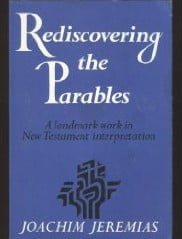Rediscovering the Parables has become a modern classic in the field of parables research (see Blomberg 10), and upon even casual perusal, a reader should be able to see clearly some of the reasons for this much-deserved status. In addition, far from being merely a dry, academic treatise, Jeremias sought to recover Jesus’ exact words (ipsissima verba) because “only the Son of man himself and his word can give authority to our preaching” (7; cf. 181). Consequently, for Jeremias, this work represented an attempt to advance both scholarship and piety. Particularly valuable is Jeremias’ extensive knowledge of Palestinian religion, culture, and sociology, which enables him at many points to suggest interpretations for Jesus’ parables, or explanations for their elements, that may genuinely enrich one’s understanding of these parables (cf. 107, 111–12, 142–43, 166).
Even so, a few occasions exist in which more recent scholarship has, perhaps, uncovered better explanations for some facets of some of the parables than Jeremias gives [e.g., 108, 164; see Martinus C. De Boer, “Ten Thousand Talents? Matthew’s Interpretation and Redaction of the Parable of the Unforgiving Servant (Matt 18:23-35),” Catholic Biblical Quarterly 50.2 (1988): 217]. Moreover, Jeremias’s stated purpose of recovering Jesus’ exact words (ipsissima verba) can downplay the historical faithfulness of the text as it exists. Yet, this step is needless on the vast majority of occasions, and its effect is wholly so. The Gospels present us with the ipsissima vox (the very voice) of Jesus. Thus, although the Gospels may summarize or paraphrase Jesus’ words at some points, they do so with fidelity to the actual, historical occurrences that they record (cf. Carson, Moo, and Morris 38–45). Nevertheless, while certain portions of the work might require qualification or revision, Jeremias’ little classic, Rediscovering the Parables, remains a veritable treasure trove of historical, cultural, and sociological information for those seeking to understand the meaning of Jesus’ parables in the historical contexts in which they were originally spoken.

Leave a Reply